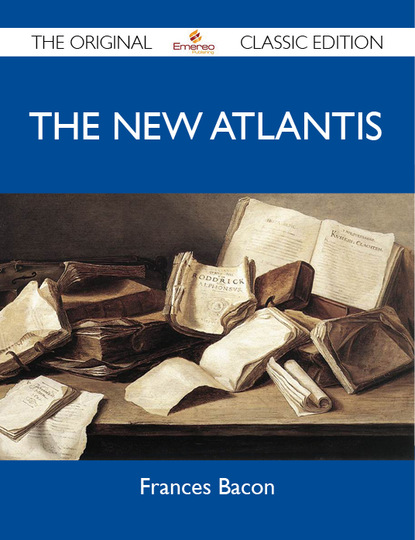
The New Atlantis - The Original Classic Edition скачать fb2
Bacon Frances - The New Atlantis - The Original Classic Edition краткое содержание
The New Atlantis is the philosophical and intellectual utopia envisioned by Francis Bacon. Published in 1627, the year after the authors death by his literary executor, speculation is that Bacon wrote his story in 1623 or 1624, which would be after his fall from political power. Unlike many of his other major works, Bacon wrote The New Atlantis in English and then had it translated into Latin, an indication that he intended it for a wider, English-speaking audience. Bacon focuses on the duty of the state toward science, and his projections for state-sponsored research anticipate many advances in medicine and surgery, meteorology, and machinery. Although The New Atlantis is only a part of his plan for an ideal commonwealth, this work does represent Bacons ideological beliefs. The inhabitants of Bensalem represent the ideal qualities of Bacon the statesman: generosity and enlightenment, dignity and splendor, piety and public spirit. <p> In 1623, Bacon expressed his aspirations and ideals in New Atlantis. Released in 1627, this was his creation of an ideal land where generosity and enlightenment, dignity and splendor, piety and public spirit were the commonly held qualities of the inhabitants of Bensalem. The name Bensalem means son of peace, having obvious resemblance with Bethlehem (birthplace of Jesus), and is referred to as Gods bosom, a land unknown, in the last page of the work. <p> In this utopian work, written in literary form, a group of Europeans travel west from Peru by boat. After having suffered with strong winds at sea and fearing for death, they did lift up their hearts and voices to God above,beseeching him of his mercy. After which, these travelers in a distant water finally reached the island of Bensalem, where they found a fair and well governed city, and were received kindly and with all humanity,by a christian and cultured people who had been converted centuries before by a miracle wrought by Saint Bartholomew, a few years after the Ascension of Jesus, by which the scriptures had reached them in a mysterious ark of cedar floating on the sea, guarded by a gigantic pillar of light over which was a cross of light. <p> Many aspects of the society and history of the island are described, such as the christian religion; a cultural feast in honor of the family institution, called the Feast of the Family; a college of sages, the Salomons House, the very eye of the kingdom, to which order God of heaven and earth had vouchsafed the grace to know the works of Creation, and the secrets of them, as well as to discern between divine miracles, works of nature, works of art, and impostures and illusions of all sorts; and a series of instruments, process and methods of scientifical research that were employed in the island by the Salomons House. <p> The work also goes on interpreting the ancient fable of Atlantis, considering the lost island as actually being the American continent, which would have had much greater civilizations in the distant past than the ones at present suggest, but whose greatness and achievements were destroyed and covered by a terrible flood, the present american indians being just descendants of the more primitive people of the ancient civilization of Atlantis who had survived the flood because they lived apart of the civilization, in the mountains and high altitudes. <p> There has been much speculation as to whether a real island society inspired Bacons utopia. Scholars have suggested numerous countries, from Iceland to Japan; Dr. Nick Lambert highlighted the latter in The View Beyond. <p> A city named Bensalem was actually founded in Pennsylvania, USA, in 1682.
Скачать книгу «The New Atlantis - The Original Classic Edition» Bacon Frances
Чтобы оставить свою оценку и/или комментарий, Вам нужно войти под своей учетной записью или зарегистрироваться



